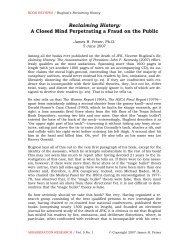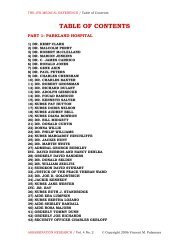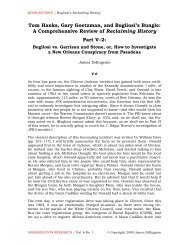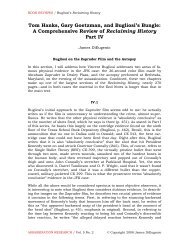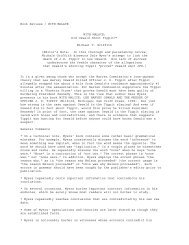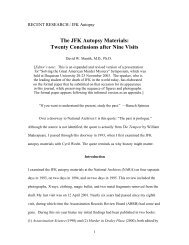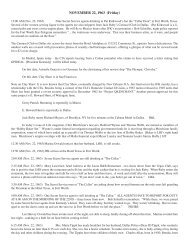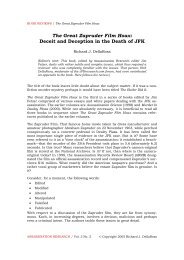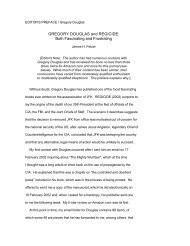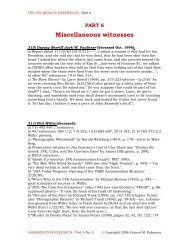A Comprehensive Review of Reclaiming History Part VIII
A Comprehensive Review of Reclaiming History Part VIII
A Comprehensive Review of Reclaiming History Part VIII
You also want an ePaper? Increase the reach of your titles
YUMPU automatically turns print PDFs into web optimized ePapers that Google loves.
James DiEugenio 10 Bugliosi’s Bungle, <strong>Part</strong> <strong>VIII</strong><br />
knew he wasn’t (Flagpole Magazine, November 19, 2003, “Sen. Richard Russell<br />
and the Great American Murder Mystery”). What even fewer people know is that<br />
Russell actually composed a letter <strong>of</strong> resignation from the Commission. Dated<br />
February 24, 1964, it was never sent to President Johnson. In it, he complains<br />
that the Commission “has been scheduling, holding, and canceling meetings<br />
without notifying him” (ibid.). If one adds in the Southern Wing’s performance<br />
with Marina to their hesitance in signing onto the Single Bullet Theory at the<br />
September 18, 1964 Executive Session hearing (see <strong>Part</strong> IV, Section IV.1), it’s<br />
easy to understand why the Troika didn’t want him. Russell disagreed with the<br />
Single Bullet Theory based on two strong pieces <strong>of</strong> evidence: (1) the testimony <strong>of</strong><br />
John Connally as to hearing the first shot, and turning before he was hit; and<br />
(2) the Zapruder film (Flagpole Magazine, op. cit.) As I previously noted, Rankin<br />
tricked Russell into thinking that his objections would be noted at this meeting.<br />
There was a woman there who Russell thought was from the stenographic firm.<br />
She wasn’t; there is no stenographic record <strong>of</strong> this meeting (McKnight, p. 295).<br />
Harold Weisberg later informed Russell <strong>of</strong> Rankin’s deception (ibid., p. 296).<br />
To me, the emerging record <strong>of</strong> Russell as the first dissenter—perhaps the first<br />
critic—<strong>of</strong> the Commission is one <strong>of</strong> the most important developments in the<br />
scholarship on the Warren Commission to appear <strong>of</strong> late. Russell did not criticize<br />
the Commission in public until November 20, 1966, in The Atlanta Constitution.<br />
There he said that he harbored a lingering dissatisfaction with the Commission’s<br />
work, and that he disagreed with the Single Bullet Theory. In 1968,<br />
he went further and told Weisberg that the Commission had been deceived by<br />
the CIA and FBI in two key areas: (1) Oswald’s background; and (2) the ballistics<br />
evidence (op. cit., Dick Russell).<br />
Russell left the records <strong>of</strong> his work from the Commission at the University <strong>of</strong><br />
Georgia Library; many people other than Dick Russell have used them, and<br />
there have been several unpublished scholarly papers based upon those<br />
records, by students like Gary Diamond and Dani E. Biancolli. (The last is supposed<br />
to be the best discussion <strong>of</strong> this subject yet to appear.) In 21 years, Bugliosi<br />
apparently never consulted those archives or read those research papers.<br />
This tells us much about what he was up to in <strong>Reclaiming</strong> <strong>History</strong>.<br />
“He is more or less inclined to be a Fascist.”<br />
<strong>VIII</strong>.3<br />
——Harold Ickes on John McCloy<br />
As critical as Russell was about the Warren Commission, he was never as vituperative<br />
or as specific as Hale Boggs. Boggs famously said that “Hoover lied his<br />
eyes out to the Commission—on Oswald, on Ruby, on their friends, the bullets,<br />
the gun, you name it” (Texas Observer, November 1998). The congressman’s regrets<br />
about his service on the Commission were well known to his family. In the<br />
1970s, his widow Lindy Boggs took over his seat in Congress. In keeping with<br />
his wishes, she became one <strong>of</strong> the early backers <strong>of</strong> the bill to authorize a new<br />
inquiry into the JFK case, which became the House Select Committee on Assassinations<br />
(HSCA). Senator Cooper once expressed concerns over contradictions<br />
ASSASSINATION RESEARCH / Vol. 6 No. 1 © Copyright 2009 James DiEugenio



